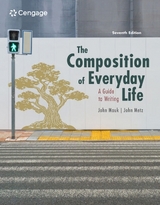
The Composition of Everyday Life, Brief (w/ MLA9E & APA7E Updates)
Wadsworth Publishing Co Inc (Verlag)
978-1-337-55606-4 (ISBN)
- Titel erscheint in neuer Auflage
- Artikel merken
John Metz began teaching college writing as a graduate student at the University of Toledo in 1983. He then taught at University of Toledo, Umpqua Community College and Kent State University over the next forty years. He focused on helping students learn to invent ideas, make appropriate rhetorical decisions and redefine what writing is or can be. His students sometimes said, “I thought this was supposed to be a writing course.” John Mauk, Ph.D., has a doctorate in rhetoric and writing from Bowling Green State University and a master's degree in language and literature from the University of Toledo. Over a 24-year career, he taught composition at Owens Community College, Northwestern Michigan College and Miami University. He was twice named professor of the year. He now writes in various genres, edits manuscripts for professional writers and teaches in continuing education programs. He also hosts Prose from the Underground, a video series featuring interviews and practical advice for working writers.
Part I: INVENTION.
1. Inventing Ideas.
Introduction. Asking Questions. Re-Inventing Education. Reading for Rhetoric. How To Use The Composition Of Everyday Life. Inventing Ideas Assignment.
2. Remembering Who You Were.
Readings. Selling Manure," Bonnie Jo Campbell. "How I Lost the Junior Miss Pageant," Cindy Bosley. "The Thrill of Victory . . . The Agony of Parents," Jennifer Schwind-Pawlak [Student essay]. Invention. Point of Contact. Analysis. Public Resonance. Thesis. Rhetorical Tools. Revision. Reflection. Beyond the Essay.
3. Explaining Relationships.
Readings. "Americans and the Land," John Steinbeck. "Mugged," Jim Crockett. "Tinder, You, and Me," Kellie Coppola. [Student essay]. Invention. Point of Contact. Analysis. Public Resonance. Thesis. Rhetorical Tools. Revision. Reflection. Beyond the Essay.
4. Observing.
Readings. "Living Like Weasels," Annie Dillard. "The Front Porch," Chester McCovey. "Red Raiders Fans," Taylor Perry. [Student essay.] Invention. Point of Contact. Observing a Culture: Writing an Ethnography Essay. Analysis. Public Resonance. Thesis. Rhetorical Tools. Revision. Reflection. Beyond the Essay.
5. Analyzing Concepts.
Readings. "Why 'Natural' Doesn't Mean Anything Anymore," Michael Pollan. "Black Like I Thought I Was," Erin Aubrey Kaplan. "The Real, The Bad, and The Ugly," Cassie Heidecker [Student essay]. Invention. Point of Contact. Analysis. Public Resonance. Thesis. Rhetorical Tools. Revision. Reflection. Beyond the Essay.
6. Analyzing Texts.
Readings. "The Weight of Sanity: A Sample Analysis of Ann Marie Paulin." "The Default Setting: An Analysis of David Foster Wallace," Adrienne Carr. "Politics and Audience: The New York Times' Appeal to Voters in 2016." Alison Block. [Student essay]. Invention. Point of Contact. Analysis. Public Resonance. Thesis. Rhetorical Tools. Revision. Caution: Four Common Pitfalls. Reflection. Beyond the Essay.
7. Analyzing Images.
Readings. "Rise of the Image Culture: Re-Imagining the American Dream," Elizabeth Thoman. "An Imperfect Reality," Rebecca Hollingsworth. "Look on My Works: Breaking Bad's Final Season Trailer," Nick Fendinger. [Student essay]. Invention. Point of Contact. Analysis. Thesis. Rhetorical Tools. Revision. Reflection. Beyond the Essay.
8. Making Arguments.
Readings. "The Dog Delusion," April Pedersen. "Cruelty, Civility, and Other Weighty Matters," Ann Marie Paulin. "Hive Talkin': The Buzz Around Town about Bees," Teresa Scollon. Invention. Point of Contact. Analysis. Public Resonance. Thesis. Rhetorical Tools. Revision. Reflection. Beyond the Essay: The Open Letter.
9. Responding to Arguments.
Readings. "Entitlement Education," Daniel Bruno. "'Have It Your Way': Consumerism Invades Education," Simon Benlow. "The Power of Failure: J.K. Rowling's 2008 Harvard Commencement Speech," Liz Winhover. Invention. Point of Contact. Analysis. Public Resonance. Thesis. Rhetorical Tools. Revision. Reflection. Beyond the Essay: Tattoo Design.
10. Evaluating.
Readings. "Talibanned," Benjamin Busch. "Important and Flawed," Kareem Abdul-Jabbar. "Star Trek: Where No Man Has Gone Before," Jaren Provo. [Student essay.] Invention. Point of Contact. Analysis. Public Resonance. Thesis. Rhetorical Tools. Revision. Reflection. Beyond the Essay: Classroom Evaluations.
11. Searching for Causes.
Readings. "Is Google Making Us Stupid?" Nicholas Carr. "Why We Binge-Watch Television," Kevin Fallon. "Why Millennials Are Weak," Quinn Greenwell. Invention. Point of Contact. Analysis. Public Resonance. Thesis. Rhetorical Tools. Revision. Reflection. Beyond the Essay: Photo Essay.
12. Proposing Solutions.
Readings. "Hi, I'm a Digital Junkie and I Suffer from Infomania," Manoush Zomorodi. "Your Kids Bored at School? Tell Them to Get Over It," Laura Hanby Hudgens. "Different Jobs," Dana Stewart. Invention. Point of Contact. Analysis. Public Resonance. Thesis. Rhetorical Tools. Revision. Reflection. Beyond the Essay: Comic Strips and Other Media.
13. Thinking Radically: Re-Seeing the World.
Readings. "Celibate Passion," Kathleen Norris. "Build the Wall," Ed Bell. "Unemployed, and Working Hard," Simon Wykoff [Student essay]. Invention. Point of Contact. Analysis. Public Resonance. Thesis. Rhetorical Tools. Revision. Reflection. Beyond the Essay: Visual Essay / Collage / Poster.
Part II: RESEARCH.
14. Finding Sources.
Using Catalogs and Databases. Online Catalogs. Periodical Databases. Conducting Interviews. Planning an Interview. Asking the Right Questions. Integrating Interviews into Your Writing. Creating Surveys. Generating Questions. Choosing Respondents. Recording and Using Responses.
15. Analyzing, Synthesizing, and Evaluating Sources.
Developing Critical Literacy. "Just the Facts, Please"--or Maybe Not. "Numbers Don't Lie"--or Do They? Summarizing and Analyzing Sources. Content. Context. Understanding Common Source Genres. Synthesizing Sources. Assignment: Summarizing, Analyzing, and Synthesizing Sources. Sample Synthesis: Exploring Caffeine Views, by Jim Crockett. Evaluating Sources. Relevance. Reliability. Credibility. Timeliness. Diversity. Evaluating Online Sources. Assignment: Evaluating a Source. Sample Source Evaluation.
16. Integrating and Documenting Sources.
Basic Concepts. Issues to Consider and Discuss. Why Get Information from Sources? When to Get Information from Sources. What Is Inventive Research? Where to Get Information from Sources. What Is Plagiarism? Why Document Sources? What's a Good Research Topic? Formal versus Informal Documentation. Integrating Ideas from Sources. Summary. Quotation. Special Conditions in Quoting. Organizing Sources. Blending in the Source Information. Documenting Sources. MLA Style. In-Text Citation. Works Cited. Sample Research Essay. APA Style. In-Text Citation. References. Sample Research Essay.
Part III: ORGANIZATION AND DELIVERY.
17. Organizing Ideas.
Beginning. Changing Paragraphs. Integrating Outside Sources. Counterarguing. Separating Problems and Solutions. Concluding.
18. Developing Voice.
Establishing Presence. Building Credibility. Following Conventions.
19. Vitalizing Sentences.
Controlling the Pace. Getting Specific. Cleaning the Language. Experimenting with Patterns.
Part IV: ANTHOLOGY.
20. Everyday Rhetoric.
Remembering. "A Beat Education," Leonard Kress. "The Grapes of Mrs. Rath," Steve Mockensturm. Explaining Relationships. "What the Honey Meant," Cindy Bosley. "Dog-Tied," David Hawes. Observing. "Onward, Gamers, Onward!" Royce Flores. "The Farm on the Hill," Evan Proudfoot. Analyzing Concepts. "Why We No Longer Use the 'H' Word," Dan Wilkins. "This Is What a Feminist Looks Like," Barack Obama. Analyzing Texts and Images. "Cartoons 'n Comics: Communication to the Quick," Joy Clough. "Protests with the Mostest: The Art of Opposition Through Protest Signs," Deanna Krokos. Making Arguments. "Internet Addiction," Greg Beato. "Trees Please," Michael Rust. Responding to Arguments. "Military Fraud: The Myth of Automatic Virtue," Steve Gillman. "Crimes Against Humanity," Ward Churchill. Evaluating. "Revealing the Ugly Cartoonish Truth: The Simpsons," Simon Benlow. "The Parting Breath of the Now-Perfect Woman," Chester McCovey. Searching for Causes. "Are Female Long-Distance Runners More Prone to Suicidal Depression?" Emily de la Bruyere. "American Consumerism," Jamie Benley. Proposing Solutions. "Technology, Movement, and Sound," Ed Bell. "Reverence for Food," Rachel Schofield. Thinking Radically. "Not Homeschooling? What's Your Excuse?" Tricia Smith Vaughn. "Why Tough Teachers Get Good Results," Joanne Lipman. "An Apology to Future Generations," Simon Benlow."
| Erscheinungsdatum | 03.02.2018 |
|---|---|
| Verlagsort | Belmont, CA |
| Sprache | englisch |
| Maße | 167 x 211 mm |
| Gewicht | 1116 g |
| Themenwelt | Schulbuch / Wörterbuch ► Schulbuch / Allgemeinbildende Schulen |
| Geisteswissenschaften ► Sprach- / Literaturwissenschaft ► Literaturwissenschaft | |
| Geisteswissenschaften ► Sprach- / Literaturwissenschaft ► Sprachwissenschaft | |
| Sozialwissenschaften ► Pädagogik | |
| ISBN-10 | 1-337-55606-8 / 1337556068 |
| ISBN-13 | 978-1-337-55606-4 / 9781337556064 |
| Zustand | Neuware |
| Informationen gemäß Produktsicherheitsverordnung (GPSR) | |
| Haben Sie eine Frage zum Produkt? |
aus dem Bereich



